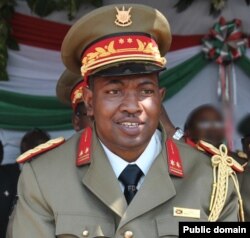The man behind Burundi’s apparent May 13 coup, Major-General Godefroid Niyombare, is well known and respected, according to an expert in the region.
“If this coup succeeds and consolidates this may well be what one may call a good coup d'etat,” said Filip Reyntjens, a professor of law and politics at the University of Antwerp in Belgium and an expert in the African Great Lakes region.
Reyntjens said that the coup may allow things to calm down in the country, and that could lead to a resumption of the political process in “a month or two.”
Niyombare made it known in February that he didn’t think President Pierre Nkurunziza should seek a third term, according to Reyntjens.
He said Niyombare wrote a memo during his tenure as chief of the Burundian national intelligence office that argued “for over 10 to 15 pages” that Nkurunziza should not seek a third term.
Niyombare was sacked after the memo leaked.
“Since then, he had no particular positions in the army,” said Reyntjens.
Burundi has been beset by violence in the weeks since Nkurunziza indicated he may seek a third term. More than a dozen people have died and tens of thousands left the country.
Earlier in his career, Niyombare also served as Burundi’s ambassador to Kenya, something Reyntjens says gives him knowledge about the regional community.
Reyntjens stressed that the coup was not an ethnic issue between Hutus and Tutsis. Both Niyombare and Nkurunziza are Hutus.
“Burundi has managed its ethnic divides quite successfully over the last 10 15 years,” said Reyntjens. “The problems that started a couple months ago was a political problem, not an ethnic problem. The strife is not between ethnic groups, it’s between political forces.”
White House spokesman Josh Earnest said Wednesday, "We call on all sides to lay down arms, end the violence and show restraint just as Burundian authorities have a responsibility to restore the necessary conditions to hold credible elections.
"We are particularly focused on ensuring that Burundian officials respect the basic democratic procedures and practices as they seek to govern that country. And there are legitimateconcerns right now that that's not happening," Earnest said, adding that the U.S. still considers Nkurunziza to be the president.






